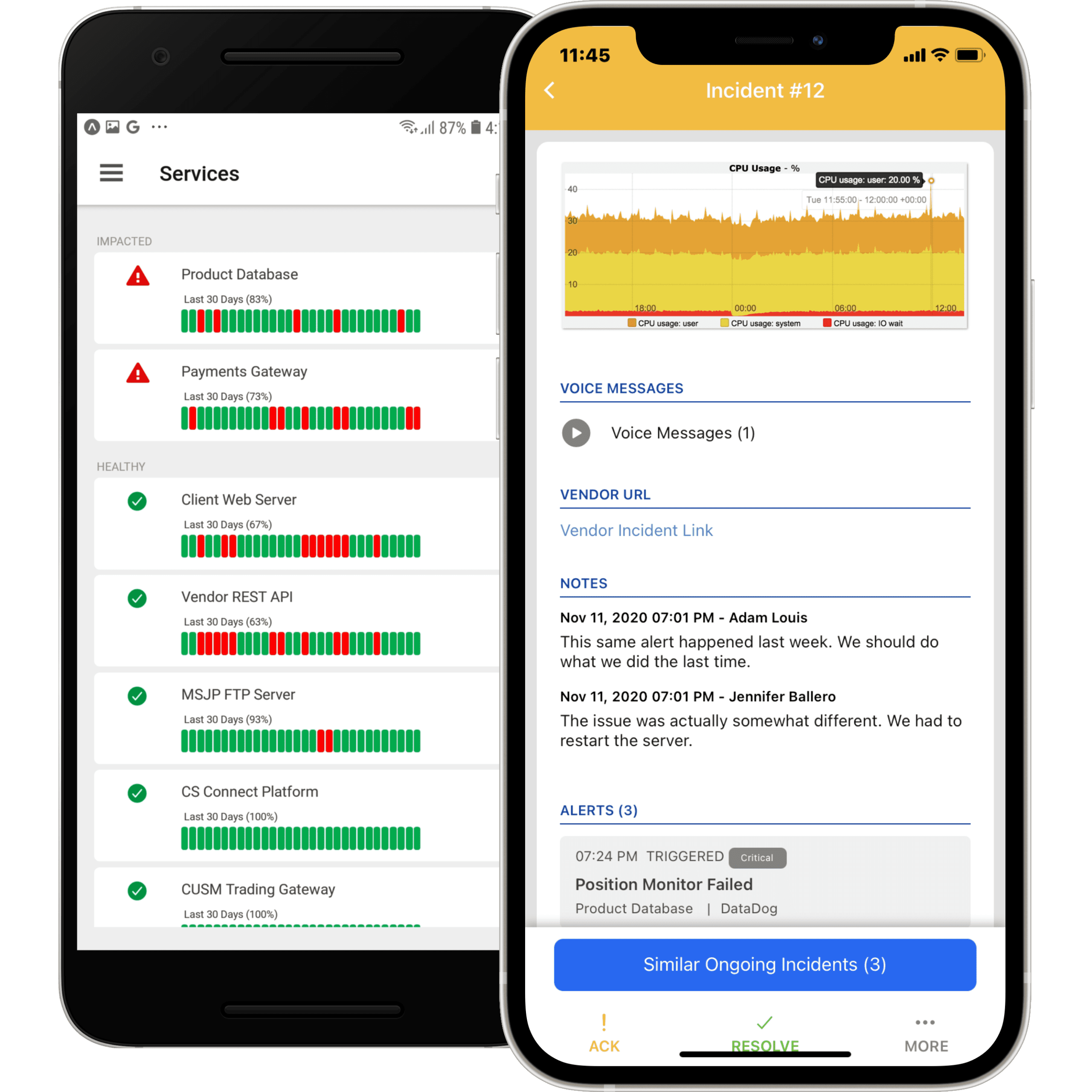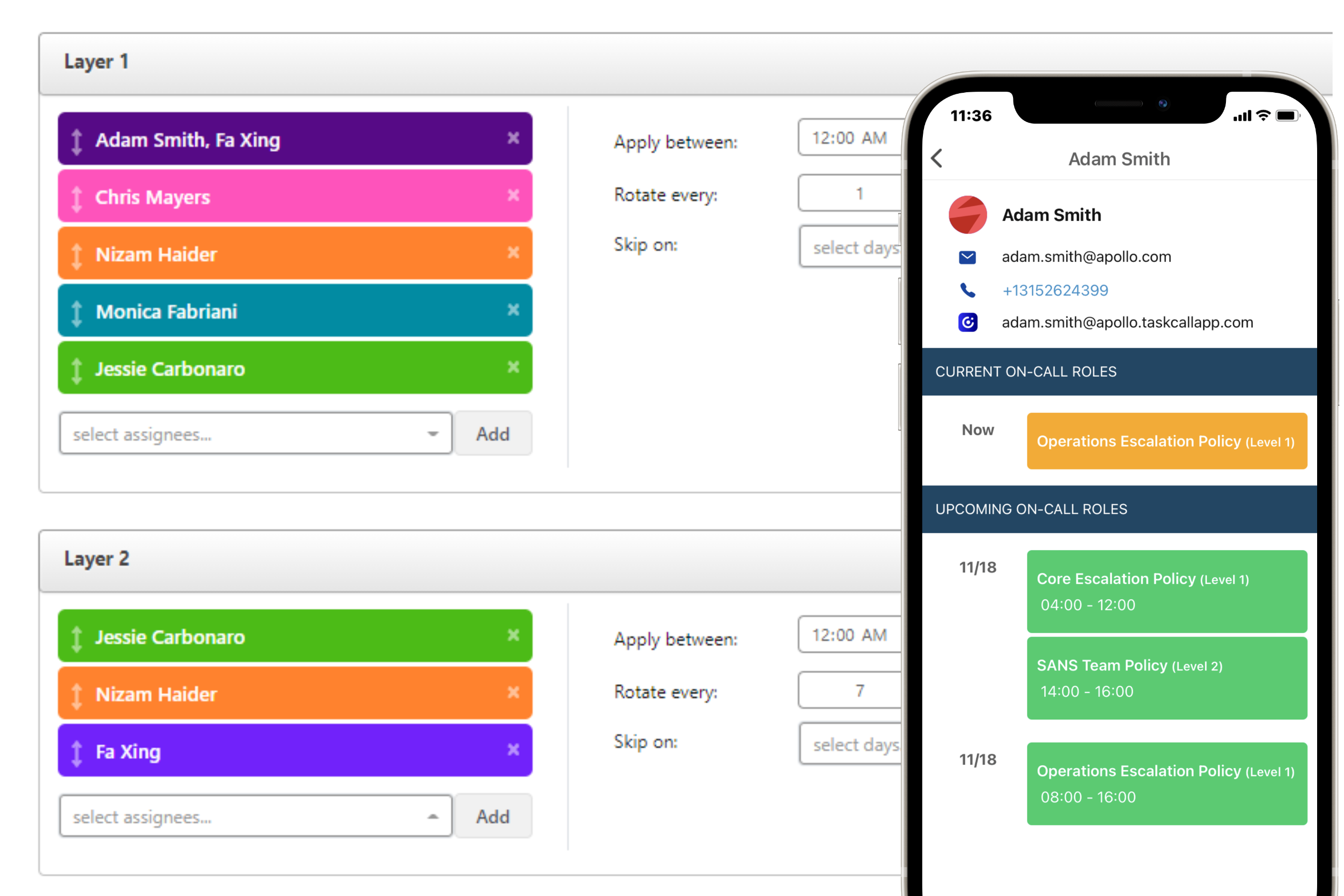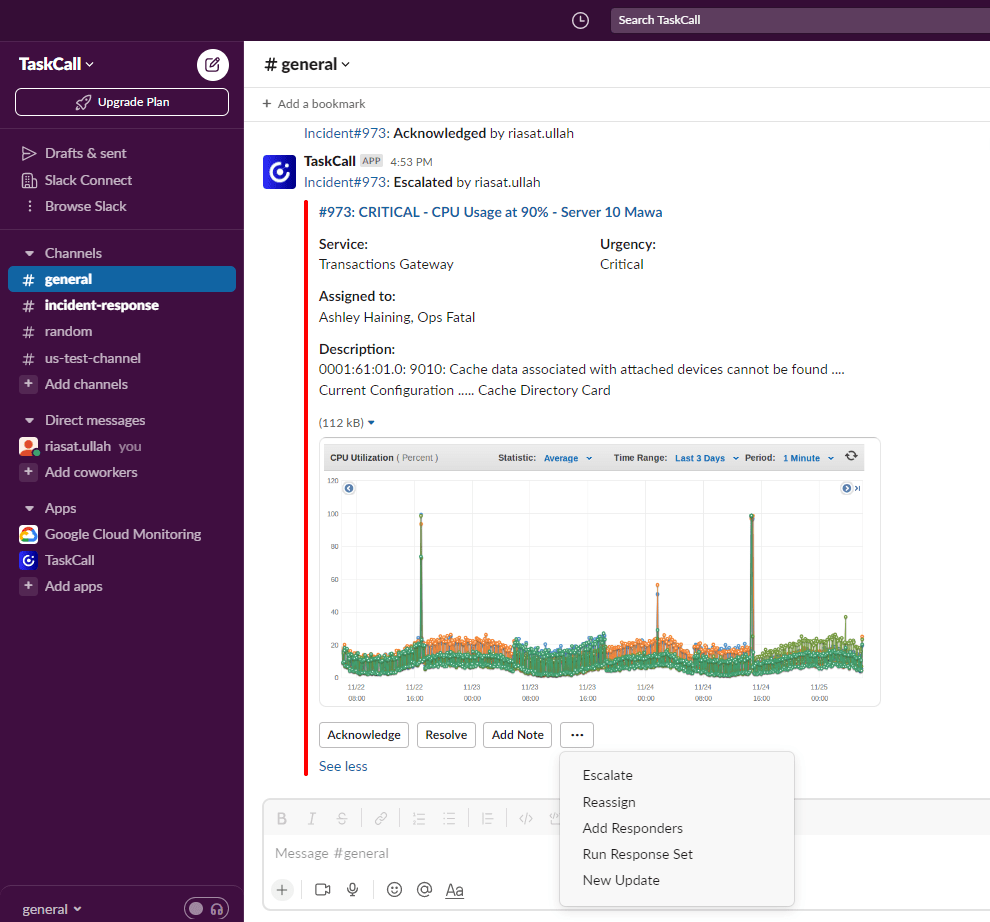Cheapest PagerDuty Alternative
PagerDuty is a great incident response product, but like most early entrants in an industry, they are able to command a higher price. Early adopters of incident response signed up for the service and now that they have been with them for so long, it is not easy to switch away. However, there are several alternatives available. Here, we will talk about one – TaskCall – which is our own product. TaskCall is 50% cheaper than PagerDuty on all pricing plans and offers the same reliability and service commitment. Even the free tier is available for up to 10 users and offers a package of features tailored specifically for small teams.
Before delving into the comparisons and similarities, we want to make sure everyone is onboard. In case you happen to bump into this article without prior understanding of incident response and management, here is a quick refresher. Incident response is the process by which ITOps and DevOps teams handle system and application errors. It aims to protect teams from interruptions so they can focus on resolving the issues faster and consequently reduce the cost of downtime. It improves IT and DevOps processes by creating a digital map of the infrastructure they own and introducing a systematic approach to handling anomalies outside day to day work. Often the emphasis is on major incidents like cyber-attacks, but there are a far greater number of everyday events that require prompt attention.

TaskCall is 50% Cheaper than PagerDuty
TaskCall is the most affordable incident response alternative in the market. You can start for free and upgrade to a paid plan as your needs evolve. Besides the free tier, there are 3 paid pricing plans, where each is more than 50% cheaper. Just consider the Business plan: both platforms offer streamlined incident response with workflows for structured businesses, but while PagerDuty costs $41 per user/month, TaskCall's pricing is $19 per user/month.
If you look at those figures closely, it is easy to see how cost effective one is over the other. A team of 50 users can save $13,200 annually by switching away from PagerDuty. That is a significant reduction in IT costs. When budgetary constraints are in place it is a no-brainer that switching would be the most prudent step forward. Even without the pressure of cost cutting, it still makes sense to switch given the savings.

With TaskCall get real-time service uptime checks and contextualize incidents with details and snapshots.
Similar Approach to Incident Response and Management
Both platforms have a very similar feel. They are both designed with user friendliness and responsiveness in mind. Unlike other platforms they do not try to combine multiple features into one. Rather they break them down into smaller components to enable the most dynamic on-call management and incident response.
Schedules and Escalations
You can create schedules for your teams to decide who goes on-call when and add escalations to them so if the primary on-call responder misses an alert, it automatically gets escalated to the secondary support. That way you will never miss an incident. Each escalation policy can be tied to a different service or component of your system. When an incident occurs on a service, only the engineers responsible for it are assembled to address it, allowing component and need based delegation. Responders are notified in tiers through emails, push notifications, SMS and voice calls.

Create your team schedule and escalations with TaskCall
Services and Integrations
The use of routing rules in conjunction with artificial intelligence to suppress unnecessary noise drastically reduces alert fatigue amongst on-call responders. Both platforms do an incredible job at further improving the on-call experience by increasing visibility of incident impact across the board. Connect with all your monitoring tools (e.g. Google Cloud, Datadog, Sentry) and manage incidents from one place. You come with your own stack and readily connect it all with built-in integrations. With all systems connected, a digital view of your infrastructure is created. Instead of working with logs alone, you can visualize the impact on your production environment and find the root cause of problems faster through automatic detection and dependency graphs.
Collaboration
Collaboration is also a key focus of both platforms. You do not need to change how you work. Incident response is brought to you where you work through chat-ops integrations like Slack, Microsoft Teams and Google Chat. Get notified on your team channel as soon as an incident occurs and act on them without leaving your chat. Acknowledge, resolve, add notes and mobilize your incident response in many other ways.

Get notified by TaskCall in Slack immediately after an incident occurs.
Stakeholder Communication
Keeping stakeholders updated through status dashboard and status update notifications allows one of the core pain points of ITOps and DevOps to be addressed – interruptions. As business managers and stakeholders are kept informed automatically, engineers can spend more time in resolving incidents rather than answering to hierarchy.
Faster Customer Support
Both platforms offer comprehensive solutions for customer support teams as well. Customer support agents are usually in the dark about backend problems. Integrations with ticketing tools like Zendesk and Freshdesk allow customer support teams to get access to technical problems so they can provide faster and more contextualized customer support without interrupting ITOps and DevOps.
Comparison
| TaskCall | PagerDuty | |
|---|---|---|
| Better Pricing TaskCall offers a free plan for up to 10 users and is 50% cheaper in all paid subscription plans | ✓ | ❌ |
| On-Call Management Schedules, escalation policies, service dependency, contextual search and tagging | ✓ | ✓ |
| Incident Response Incident handling, timeline, workflows, mobilization, chat-ops | ✓ | ✓ |
| Event Management Alert suppression, noise reduction, past incidents, similar on-going incidents | ✓ | ✓ |
| Analytics and Insights Incident analytics, MTTA, MTTR, loudest services, business impact | ✓ | ✓ |
| Customer Service Applications Built-in integrations in ticketing tools (e.g. Zendesk, Freshdesk) | ✓ | ✓ |
| Mobile Application Fully featured applications for both iOS and Android | ✓ | ✓ |
| Security and Administration | ✓ | ✓ |
| Stakeholders Single sign-on (SSO), role and team based permissions | ✓ | ✓ |
| Automated Actions Runbook automation and custom actions | ✓ | ✓ |
| Live Call Routing Route calls to on-call responders for remote call support | ✓ | ✓ |
| More Built-in Integrations PagerDuty offers more built-in integrations than TaskCall, but TaskCall is continuously adding more integrations to their platform | ❌ | ✓ |
For the most part any feature or tool that can be found in PagerDuty can also be found in TaskCall and the other way around. There are only some minor differences that may not impact your overall experience. As a newer entrant, the latter is lagging behind in the number of integrations, but it is gradually catching up. The key integrations that most companies need, however, are already available.
The low pricing offered by TaskCall quite easily makes it the most affordable PagerDuty alternative. The cost savings are monumental and should certainly be taken into account when you choose an incident response solution for your firm. The same applies for those who are trying to cut down costs by switching to another solution. IT costs can grow rapidly as your team grows. The right platform can help stall that. Evaluate your options and make the right choice. Save time. Save money.
You may also like...
Incident response is the process of addressing technical issues that occur in a company. It could be business application errors, database issues, untested deployment releases, maintenance issues or cyber-security attacks. Automation allows such incidents to be resolved fast and save losses.
One of the core pieces of maintaining a sophisticated operation is delegation of responsibilities. If one individual ends up doing bulk of the work then the whole process will be slowed down. Their individual efficiency will not hold up to the standard either.
